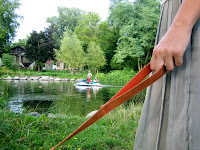She's roadside!
It started with a hearse. A black hearse, dusty, parked on the street at a house near my own. In white soap, on the windows, someone had written three initials, which I don’t recall, followed by “R.I.P.” In the back window: “We’ll always miss you.” In the side window facing the street: a red and white For Sale sign with two phone numbers scrawled in black Sharpie. I moved in to the neighborhood and noticed the hearse right away. It had red velvet curtains in the back windows. I went jogging by it every day. The inside seemed to be dusty. Morning or afternoon, I jogged by. It gathered dead pine needles and pollen and fallen leaves.
I made up stories about the hearse as I ran. Someone who’d owned it had had an accident and died. Someone who owned it had had a heart attack inside of it and died. It happened just before I moved in. It had happened years ago. But I really wanted to know the real story. Who had done this? Why? And what did they think, every time they mowed their lawn and saw it sitting there? Or returning home, mind on the groceries and a misunderstanding from work, and there, suddenly: “R.I.P.” “We’ll always miss you.” What on earth were they hoping to tell those around them? Their neighbors who lived right there? I had to call these people. There were not one, but two phone numbers listed on the red sign.
Problem was I never had a pen. Also, the hearse was parked on a road next to two houses whose driveways ran onto parallel streets, and it wasn’t clear which house the car was associated with. One of these houses had a dog that menaced me from the fenced yard whenever I passed. At the other, I never saw a soul, entering or leaving or in the window. Never heard a radio from within or the smells of food coming out.
No sign of life in the house, yet there was the hearse: a brave, bald display; their grief at eye-level. The hearse and its writing were what I would call “rude,” in terms of possessing a startling abruptness. A lot other people in this world would also call it “rude,” and mean it the usual way: thoughtless. It was like a Christmas display, complete with recorded looping carols and a spotlight, at midnight, at summer camp. Who were these people who had done this? People’s grief makes them angry, and the hearse, with its writing and its immobility, struck me as angry. Or maybe that was just my own intimidation at such a breach in the usual public order. What would such unabashed people say to me, and how would they say it?
“Call the hearse people,” or “Get hearse #!!” was a perennial item on a dozen well-intentioned To Do lists. As days stretched out into months of the year, I relaxed and shrugged and moved it to Next Week’s list, making the illogical conclusion that the time before me would surely equal the time that had passed.
And then, of course, it was gone, disappearing one day late spring. And a month or two after that, on a pretty day’s walk, I asked some neighbors about it. Oh yeah, they said. Those people had moved. They didn’t know where.
They were there, they said, and then, gone.
It started with a hearse. A black hearse, dusty, parked on the street at a house near my own. In white soap, on the windows, someone had written three initials, which I don’t recall, followed by “R.I.P.” In the back window: “We’ll always miss you.” In the side window facing the street: a red and white For Sale sign with two phone numbers scrawled in black Sharpie. I moved in to the neighborhood and noticed the hearse right away. It had red velvet curtains in the back windows. I went jogging by it every day. The inside seemed to be dusty. Morning or afternoon, I jogged by. It gathered dead pine needles and pollen and fallen leaves.
I made up stories about the hearse as I ran. Someone who’d owned it had had an accident and died. Someone who owned it had had a heart attack inside of it and died. It happened just before I moved in. It had happened years ago. But I really wanted to know the real story. Who had done this? Why? And what did they think, every time they mowed their lawn and saw it sitting there? Or returning home, mind on the groceries and a misunderstanding from work, and there, suddenly: “R.I.P.” “We’ll always miss you.” What on earth were they hoping to tell those around them? Their neighbors who lived right there? I had to call these people. There were not one, but two phone numbers listed on the red sign.
Problem was I never had a pen. Also, the hearse was parked on a road next to two houses whose driveways ran onto parallel streets, and it wasn’t clear which house the car was associated with. One of these houses had a dog that menaced me from the fenced yard whenever I passed. At the other, I never saw a soul, entering or leaving or in the window. Never heard a radio from within or the smells of food coming out.
No sign of life in the house, yet there was the hearse: a brave, bald display; their grief at eye-level. The hearse and its writing were what I would call “rude,” in terms of possessing a startling abruptness. A lot other people in this world would also call it “rude,” and mean it the usual way: thoughtless. It was like a Christmas display, complete with recorded looping carols and a spotlight, at midnight, at summer camp. Who were these people who had done this? People’s grief makes them angry, and the hearse, with its writing and its immobility, struck me as angry. Or maybe that was just my own intimidation at such a breach in the usual public order. What would such unabashed people say to me, and how would they say it?
“Call the hearse people,” or “Get hearse #!!” was a perennial item on a dozen well-intentioned To Do lists. As days stretched out into months of the year, I relaxed and shrugged and moved it to Next Week’s list, making the illogical conclusion that the time before me would surely equal the time that had passed.
And then, of course, it was gone, disappearing one day late spring. And a month or two after that, on a pretty day’s walk, I asked some neighbors about it. Oh yeah, they said. Those people had moved. They didn’t know where.
They were there, they said, and then, gone.


